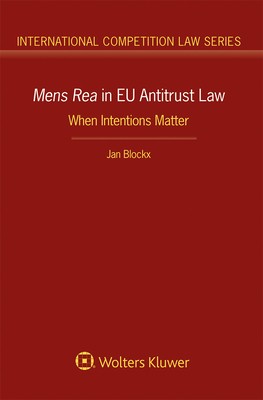
- Išsiųsime per 10–14 d.d.
- Autorius: Jan Blockx
- Leidėjas: Kluwer Law International
- ISBN-10: 9403523530
- ISBN-13: 9789403523538
- Formatas: 15.6 x 23.4 x 1.6 cm, kieti viršeliai
- Kalba: Anglų
- Extra -15 % nuolaida šiai knygai su kodu: ENG15
Atsiliepimai
Aprašymas
Under the purely economics-based approach to competition law, the central consideration is whether the conduct of undertakings has the effect of restricting competition or not. Such an 'objective' approach to antitrust enforcement leaves little room for subjective elements like intentions. But what happens when economic analysis reaches its limits? In this signal contribution, the author invokes the criminal law concept of mens rea, the idea of the 'guilty mind', thoroughly evaluating the normative cogency of mens rea evidence in the determination of antitrust infringements.
Delving deep into the case law, the author views the subject from the standpoint of a confluence of various areas of law, including:
- the role of mens rea in the criminal law in France, Germany, and England and Wales;
- the different types of mens rea (e.g., intent, recklessness, negligence);
- mens rea in a corporate context;
- mens rea evidence in United States antitrust law;
- the notion of the 'meeting of minds' in Article 101 TFEU;
- relevance of intentions in the determination of the object of an agreement or concerted practice;
- relevance of intentions in the determination of abuse of a dominant position; and
- the role of mens rea in the determination of fines for antitrust breaches.
The author also examines arguments both for and against the use of mens rea evidence in determining whether an antitrust infringement took place and how it should be punished.
This is the first full-length assessment of what role mens rea evidence actually plays and should play in competition law even as the tools for antitrust analysis are meant to become increasingly objective. As a thoroughly researched and systematically presented commentary and analysis of the current status of the use of mens rea in antitrust enforcement and how the practice could develop, it is sure to be welcomed by practitioners as well as by policymakers and academics.
EXTRA 15 % nuolaida su kodu: ENG15
Akcija baigiasi už 1d.21:07:39
Nuolaidos kodas galioja perkant nuo 10 €. Nuolaidos nesumuojamos.

- Autorius: Jan Blockx
- Leidėjas: Kluwer Law International
- ISBN-10: 9403523530
- ISBN-13: 9789403523538
- Formatas: 15.6 x 23.4 x 1.6 cm, kieti viršeliai
- Kalba: Anglų
Under the purely economics-based approach to competition law, the central consideration is whether the conduct of undertakings has the effect of restricting competition or not. Such an 'objective' approach to antitrust enforcement leaves little room for subjective elements like intentions. But what happens when economic analysis reaches its limits? In this signal contribution, the author invokes the criminal law concept of mens rea, the idea of the 'guilty mind', thoroughly evaluating the normative cogency of mens rea evidence in the determination of antitrust infringements.
Delving deep into the case law, the author views the subject from the standpoint of a confluence of various areas of law, including:
- the role of mens rea in the criminal law in France, Germany, and England and Wales;
- the different types of mens rea (e.g., intent, recklessness, negligence);
- mens rea in a corporate context;
- mens rea evidence in United States antitrust law;
- the notion of the 'meeting of minds' in Article 101 TFEU;
- relevance of intentions in the determination of the object of an agreement or concerted practice;
- relevance of intentions in the determination of abuse of a dominant position; and
- the role of mens rea in the determination of fines for antitrust breaches.
The author also examines arguments both for and against the use of mens rea evidence in determining whether an antitrust infringement took place and how it should be punished.
This is the first full-length assessment of what role mens rea evidence actually plays and should play in competition law even as the tools for antitrust analysis are meant to become increasingly objective. As a thoroughly researched and systematically presented commentary and analysis of the current status of the use of mens rea in antitrust enforcement and how the practice could develop, it is sure to be welcomed by practitioners as well as by policymakers and academics.




Atsiliepimai